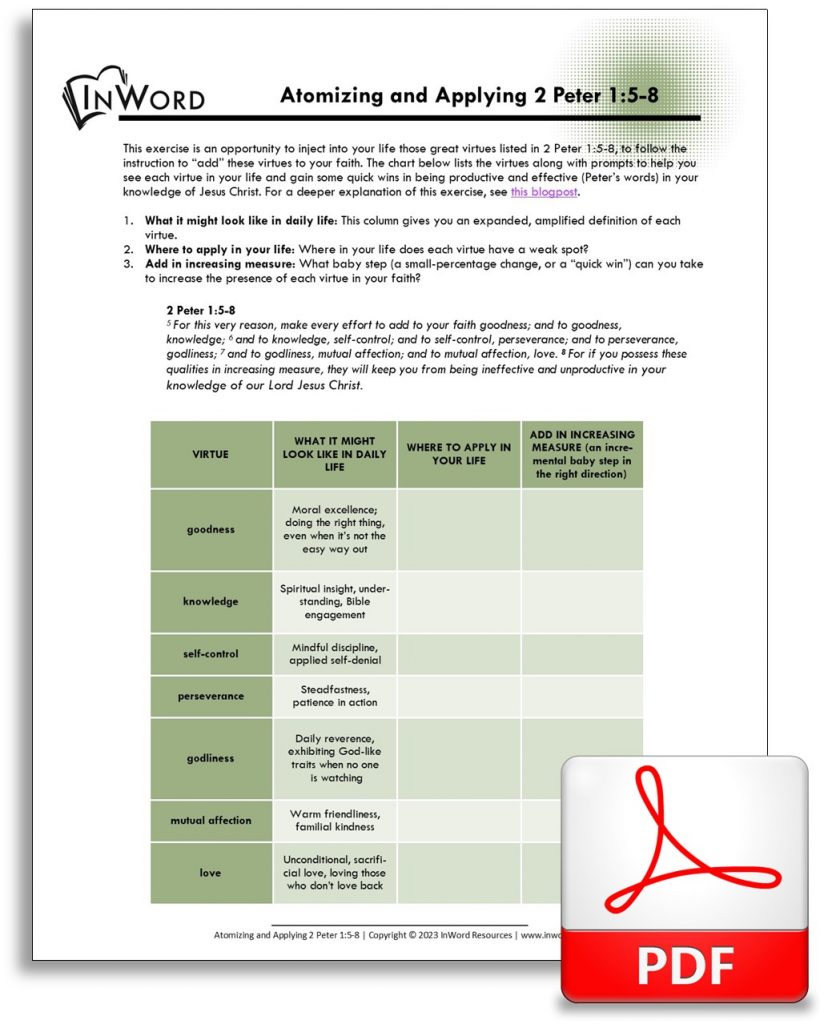
I am in the middle of a random mash up between the book of 2 Peter, which is a letter to the early church, and the book Atomic Habits (tag line: “Tiny Changes, Remarkable Results”), which is a New York Times Bestseller. Through completely independent paths I happen to be doing a personal study of 2 Peter while reading Atomic Habits, albeit late to the party (it was published in 2018). I was drawn to the book for professional and personal reasons: professionally, its length of time on the NYT Bestseller List shows that the book has attracted enough cultural attention that it’s worth understanding; personally, I certainly have bad habits I’d like to stop and good habits I’d like to start.
While I’m not finished with the book, the early and over-simplified takeaway is that the best way to stop (or start) a habit is to simply make incremental change. Rather than crash diet and expect a long-lasting change in lifestyle, try decreasing your chips intake by five percent and increasing your broccoli intake by five percent (or one percent, let’s be reasonable).
One morning while mulling over this concept of incremental change, I read this in 2 Peter (emphasis added):
2 Peter 1:5-8 (NIV):
5 For this very reason, make every effort to add to your faith goodness; and to goodness, knowledge; 6 and to knowledge, self-control; and to self-control, perseverance; and to perseverance, godliness; 7 and to godliness, mutual affection; and to mutual affection, love. 8 For if you possess these qualities in increasing measure, they will keep you from being ineffective and unproductive in your knowledge of our Lord Jesus Christ.
The obvious mash-up question: Can the principles advanced in Atomic Habits be helpful tools to “add” these great life virtues to my faith “in increasing measure”? Being a sucker for serendipity, it becomes more a question of whether the principles are intended to be helpful tools. The Atomic Habits principle of “tiny changes” sure sounds like the 2 Peter principle of “increasing measure.” Further, being effective and productive in my knowledge of Jesus would certainly be “remarkable results”! I consider this a small breakthrough in that I can use all the help I can get when applying a biblical instruction to my life.
So, in mashing up 2 Peter 1:5-8 and Atomic Habits, here’s what emerges:
1. Start where we are:
If we reach a stale spot in our faith journey, feeling ineffective or unproductive (to use Peter’s words), it’s helpful to know we do not need to rely on an inspiring sermon, or a stirring convention, or a rousing concert from our favorite Christian artist to give us a spiritual spark. We can start where we are and with what we have and baby-step our way to an effective, productive (read vibrant) walk with Jesus. In fact, Peter writes just prior to this passage that God’s divine power has given us everything we need to live a godly life. And then Peter lists seven lifestyle virtues to add to our faith—virtues that will make a noticeable change if we apply them in increasing measure.
In Atomic Habits, the author advances four laws for developing new habits: 1) Make it obvious; 2) Make it attractive; 3) Make it easy; 4) Make it satisfying. Think about how you can add the virtue of “goodness” to your faith in a small way. Here’s an example: Build your “goodness” muscle by showing appreciation for first-responders or healthcare providers in your area. Initiate a “cookie blitz” (this can be on a personal scale with you or your family, or a large scale with your youth ministry)—taking plates of homemade cookies to fire stations, nurse’s stations, nursing homes, etc. You’ll find that this act touches on all four laws of habit-making and you may find it spilling over to other areas of life.
2. The mental benefits of quick wins:
It’s been shown, rather definitively, that quick wins generate mental benefits. They build encouragement and motivation to achieve the next, and possibly bigger, thing. This is a key tenet that author James Clear uses to great effect in explaining his points in Atomic Habits. Of course, this is science and psychology, again, catching up to Scripture, discovering that we are hard-wired for a key tenet of the gospel. We’ve long known the psychological (and physiological) benefits of forgiveness and gratitude. Management gurus are now unknowingly touting the benefits of 2 Peter 1, which calls for adding lifestyle virtues with quick wins, or to use Peter’s words, in “increasing measure.”
This is subtly different from goal setting. Rather than setting a goal to achieve a particular virtue, such as self-control, consider viewing the virtue through a new paradigm. Instead of attempting to achieve self-control in nutrition by setting a calorie goal, think of yourself as someone who practices moderation in food consumption and then create a system of quick wins that supports this picture of moderation. Go for a sampling of the cheesecake instead of the size your eyes desire; share a cup of raspberry/chocolate chunk ice cream rather than ordering your own three scoops in a waffle cone; establish a designated, and limited, chocolate time rather than graze on chocolate throughout the day. (Can you tell I’ve been working on this principle?) These acts will create necessary brain pathways that eventually lock in these new habits as a lifestyle. You will soon be someone who practices moderation, not simply someone who thinks of themselves as practicing moderation.
3. Perpetual jump-in point:
In the ebb and flow of life, it’s easy to lose spiritual momentum: in our habits, in our mindfulness, in our vitality. And the longer we go, the more difficult it becomes to re-start. The faster the merry-go-round spins, the harder it is to jump on to the merry-go-round. And so, we simply don’t jump on. But the words of 2 Peter 1 give us a standing jump-on spot. Don’t have a personal Bible study plan going? Has your prayer life been haphazard at best and non-existent at worst? Read 2 Peter 1:5-8 and simply start where you are. Drive a stake down on each lifestyle virtue that is listed and make a personal commitment that from this day, you will accept where you are and establish some “quick win” goals to move forward. In Atomic Habits, the author draws a distinction between “motion” and “action.” Motion is strategizing and planning. These are good, but we can get stuck there, failing to launch. Action is behavior that will deliver an outcome. The more we repeat an action, the better chance we have of the action becoming a habit.
As an example, if you are looking for the 2 Peter 1 virtue of knowledge to become a habit, spend a few minutes in motion—thinking through some “quick win” Bible ideas (owning a one-chapter book like Jude) and then take action by implementing a new Bible time in your day for the next 30 days. And of course, implement other principles of Atomic Habits by making the time obvious, attractive, easy, and satisfying.
TRY IT OUT!
I invite you to put this blogpost into practice. Download the exercise “Atomizing and Applying 2 Peter 1:5-8,” and use this to gain some “quick wins” in being “effective and productive” in your knowledge of Jesus Christ. It’s a 20-minute exercise that will give you a lifetime of impact.

Thank you!

Barry Shafer
Founder/Director, InWord Resources